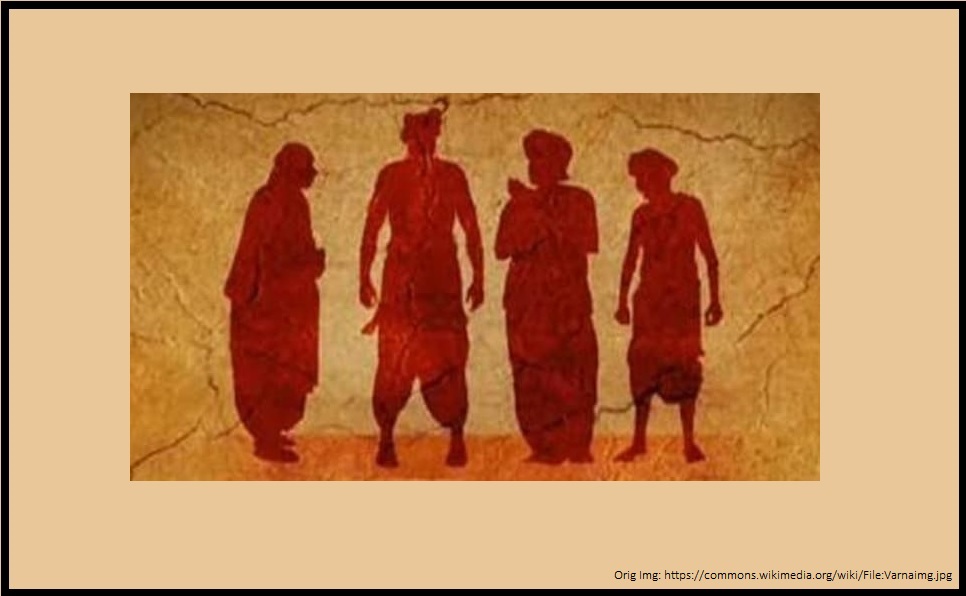In this article, we look into the foreign origin of word Hindu, the original meaning of the word Hindu, how the meaning of the word Hindu changed during the course of history and reached its current meaning. We will also look into the claim regarding the occurrence of the Hindu word in Vedas.
Hindu word in Vedas
Some nationalist mention that the word Hindu is derived from the expression ‘Saptasindhu’, which occurs in Rigveda on several occasions. However, this conclusion is forceful.
- The expression that occurs in Rigveda is ‘Saptasaindhvah’ and not ‘Saptasindhu’.
- The expression means different things in different contexts. It is not clear whether it stands for country or people or simply for the seven rivers of Punjab.
- The word Hindu appeared in our indigenous languages only after the Islamic invasions (from 7th century onwards) & was used very sparsely in local literature. It doesn’t explain why the change from ‘Sindhu’ to ‘Hindu’ took such a long time to surface.
- Most significantly, it doesn’t explain why our countrymen were never known as Hindu in South-east Asia in pre-Islamic period although they had a large presence there even before the birth of Christ.
During pre-Islamic period (i.e. before the 7th century) our ancestors shared common name for their homeland – Bharatvarsa. Bharatvarsha comprises present day Seistan province of Iran, Afghanistan, Pakistan, India, Nepal & Bangladesh. They also shared a common name for the spiritual-cultural complex which they adhered to – ‘Sanatana dharma’. It covered Brahminism, Buddhism, Jainism & other religions (now known as tribal religions). Our people also traveled abroad in all directions & had established many settlements in foreign lands. However, none of the literature describing their journeys or the epigraphs describing their presence abroad mention any generic or collective name by which they were known or made themselves known to the people of foreign countries.
Thus, it is quite clear that our ancestors didn’t use the word Hindu for describing themselves collectively.
The foreign origin of word Hindu and its meaning
The origin of word Hindu can be traced back to Avesta, the scripture of Zoroastrianism religion. It was used for the first time by ancient Iranians (Persians) for this country (Bharatvarsha) and its people. It was simply their way of pronouncing ‘Sindhu’, the name of the river which has been a major landmark for travelers who traveled to Bharatvarsha from north-west. Initially this word seems to have been used for the provinces and the people in the vicinity of Sindhu. Later it was used for all parts of this country and its people. The word Hindu also spread to countries to the north and west of Iran. The ancient Greeks used the word ‘Indus’ & ‘Indoi’ – their way of pronouncing the words ‘Sindhu’ & ‘Sindhis’. The ancient Arabs, Turks, Mongolians and Chinese became also familiar with the word Hindu.
Thus, in its early days the word Hindu was used by foreigners for the people of Bharatavarsha and the word had no association with class, caste or religion.
The word Hindu gets associated with religion
The meaning of word Hindu started changing and got associated with religion with the rise of Zoroastrianism and spread of Buddhism in Iran. The rift started appearing with the rise of Zoroastrianism in Iran & became bitter by the time the Archaeminid dynasty rose to power (~559 BCE) in Iran. Zoroastrianism became the state religion of Iran. Iraninans started looking down upon Hindus as worshippers of ‘Dev’, their word for demon. Also, Iraninans were using the word ‘Ahura’ (similar to Sanskrit ‘Asura’) for their own deity. Things became more hostile with the spread of Buddhism in Khusaran region (lying in present day northeastern Iran, southern Turkmenistan, and northern Afghanistan) and Central Asia. Also, with the spread of Buddhism, the temples of ‘Budd’ or ‘But’ (their name for Buddha) outnumbered the temples of Dev. By the time the Arabs appeared on the scene, the word Hindu became synonymous with the word ‘but-prast’ (worshiper of Budd or But) in Persian language. Every hindu place of worship became known as ‘but-khana’ i.e. house of But or Budd. It is important to note that the Iranians had no knowledge about many ways of worship amongst Hindus. For them all hindus were but prast.
Thus, the word Hindu had acquired a religious connotation but it was still used by foreigners for the people of Bhartavarsa. Also, the word was not yet used within the borders of the country.
The word Hindu gets used within the nation by Islamic invaders
Later Isalmized Arabs and Turks started using the word but prast more more frequently (because of heavy burrowing from Persian language). They also started using the word ‘atish-prast’ (fire worshiper). The Muslim chronicles describing Islamic conquest & rule in different parts of the country do not mention anywhere the the natives of this country known by name other than ‘Hindu’. There were also some Jews, Christains & Zoroastrian communities settled here. However, the chronicles distinguished these communities from Muslims & natives of this country. All natives were identified as Hindu irrespective of sect or subsect or their numerous ways of worship during the Islamic invasions and rule over this country. There were no Jains, no Buddhist, no Saivas, no Vaishnavas or no Saktas. All natives were attacked as Hindus, massacred as Hindus, plundered as Hindus, converted forcibly as Hindus, captured and sold in slave markets as Hindus. The Muslims never cared about which temple housed which deity. For them all temples were identified as but khanas fit to be destroyed. Similarly all priests & monks irrespective of their sect or sub-sect were ‘wicked Brahmins’ & fit to be molested or slaughtered. Thus during the rule of Islam all schools and sects of Sanatana dharma were considered as Hindu. Furthermore, the natives of this country were organized in a hierarchy consisting of many classes, caste and sub-castes. But the Islamic invaders only recognized Brahmins as a separate caste. There were no distinctions between other high caste and low caste Kafirs while killing them, converting them, plundering their wealth or capturing them as well as their women & children as slaves. Thus, in eyes of the Muslims, all natives (apart from the one who had converted to Islam willingly or unwillingly) were indistinguishable & connoted as Hindu.
Thus, during the Islamic conquest the word Hindu started being used within the country by Islamic invaders. Key point to note here is that the word was a hated word for natives as well as Islamic invaders.
The word Hindu starts getting used by natives of the country
By the time Islam started setting its feet in South & Vijaynagara empire took shape, the word Hindu was no longer a hated word for natives as it was for foreigners. Various archeological evidence dated 12th to 14th century obtained from Tamilnadu, Andhra Pradesh,Jodhpur, Karnataka and Bihar show the Kings being hailed by titles incorporating the word Hindu for their fight against Islamic conquests. By the middle of the 14th century, the word Hindu had dropped negative connotations associated with it & acquired a lot of luster in the eyes of country-men. Native heroes such as ‘Maharana Kumbha’ (Mewar) and ‘Krishnadevraya’ (Vijaynagar Empire) who defeated Islamists attacks were hailed as Hindu heroes. ‘Maharana Pratap’ (Mewar) became known as hindu-kula-kamala-divakara i.e the sun which brings bloom to the lotus that is Hindu nation. ‘Chhatrapati Shivaji’ (Maratha) was hailed as savior of Hindu dharma for his onslaught against Islamic invaders. Similarly, Guru Gobind Singh was also considered as a protector of Hindu dharma. Thus, ‘Santana dharma’ came to be known as ‘Hindu dharma’. Later numerous poets & saints arose in Bharatvarsha sang hymns praising Hindu dharma.
Thus, the phrase ‘Hindu dharma’, which is used now, was never used by our ancestors. Our ancestors used the word ‘Sanatana dharma’ for their vast spiritual-cultural complex covering Brahminism, Buddhism, Jainism and other religions (now known as tribal religions). The word Hindu was first used by ancient Iranians, its meaning changed through the course of history and at some point of time we adapted the word Hindu with pride. Even today, most of the people consider their religion as ‘Hindu dharma’ and consider themselves as Hindus. Though lately many Hindus have started addressing their religion as ‘Sanatana dharma’ and are considering themselves as Sanatanis.
Reference: Hindus and Hinduism – Manipulation of Meanings – Sitaram Goel


